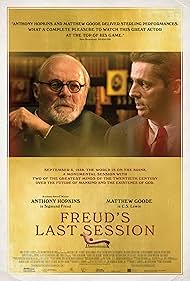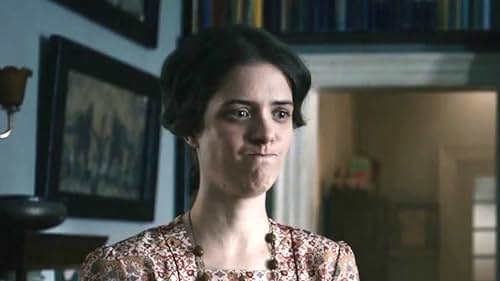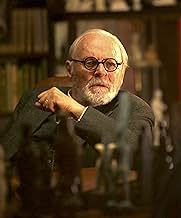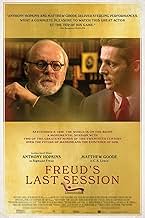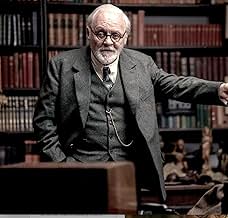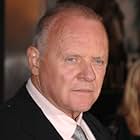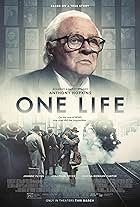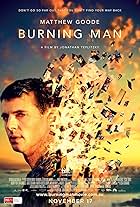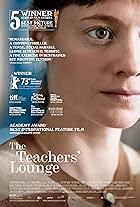Psychoanalyst Sigmund Freud invites professor C.S. Lewis to debate the existence of God, Freud's unique relationship with his daughter, and Lewis' unconventional relationship with his best f... Read allPsychoanalyst Sigmund Freud invites professor C.S. Lewis to debate the existence of God, Freud's unique relationship with his daughter, and Lewis' unconventional relationship with his best friend's mother.Psychoanalyst Sigmund Freud invites professor C.S. Lewis to debate the existence of God, Freud's unique relationship with his daughter, and Lewis' unconventional relationship with his best friend's mother.
- Awards
- 1 nomination
George Andrew-Clarke
- Paddy Moore
- (as a different name)
Anna Amalie Blomeyer
- Ilsa
- (as Anna Blomeyer)
Storyline
Did you know
- TriviaAnthony Hopkins had previously portrayed C.S. Lewis in Shadowlands (1993) 30 years prior to this film.
- GoofsLewis is shown researching the Gospels while a woman who appears to be his wife calls him to bed. This film takes place in 1939, but Lewis did not marry Joy Davidman Gresham until 1956. The woman was actually Janie Moore, who Lewis lived with until 1949.
- Quotes
[last lines]
Sigmund Freud: From error to error, one discovers the entire truth.
- ConnectionsFeatured in The Project: Episode dated 19 April 2024 (2024)
- SoundtracksVariations on an Original Theme, Op. 36, 'Enigma' Variation 9: Nimrod
Composed by Edward Elgar
Performed by Symfonický orchester Slovenského rozhlasu (as Slovak Radio Symphony Orchestra) & Adrian Leaper (Conductor)
Licensed courtesy of Naxos Music UK Ltd
Featured review
Hopkins playing Freud was bound to be hit or miss. Unfortunately, he delivers here one of his familiar, highly mannered performances. Whenever this "Freud" opens his mouth, he speaks in the same rapid, slightly eccentric rhythm Hopkins favors. Then he pauses, reflects a moment, flashes a sudden rueful grin, and utters a little chuckle or cackle. It's been Hopkins' default style throughout his career (at least when not playing Lecter), this time with a Viennese accent. I doubt Freud was ever so hammy.
My faith was also shaken early in the movie when, for no discernible reason, the order of two famous events was reversed. On September 3, 1939, Prime Minister Chamberlain announced over the radio that the nation was at war with Germany. A few minutes later, air raid sirens went off, terrifying London's populace. (It proved to be a false alarm.) For some reason, the movie has the false air raid preceding the declaration of war.
It also features, in connection with Chamberlain's broadcast, an old bête noire of mine: A large group of psychologists is listening to his historic speech on the radio, and when it's over, the BBC announcer says something like "That ends the Prime Minister's message" -- at which point someone (is it Anna Freud?) snaps off the radio. No one would do that in real life, with war just declared and with urgent government announcements yet to follow (and there were plenty of them).
One further complaint: the clumsy way flashbacks are shoehorned into the narrative, giving us the backstories of Freud, Lewis, and Anna, with a heavy emphasis on Anna's lesbianism.
Incidentally, considering that C. S. Lewis was one of the most brilliant speakers in Britain -- eloquent, persuasive, never at a loss for words -- he is uncharacteristically tight-lipped, timid, and hesitant in this movie, even for someone being courteous to a revered, dying old man. Armand Nicholi's fanciful book "The Question of God," one of the inspirations for this movie, lets the two iconic figures battle it out, with Lewis (and God) ultimately gaining the upper hand. But in this movie's version of that imaginary encounter, Lewis has little to say. It is all Freud's show.
At least the movie is handsomely mounted; it's nice to see what Freud's office must have looked like. That aside, I can't see the point of the movie. Is it just to give Hopkins the chance to do another bad impersonation of a historical figure?
My faith was also shaken early in the movie when, for no discernible reason, the order of two famous events was reversed. On September 3, 1939, Prime Minister Chamberlain announced over the radio that the nation was at war with Germany. A few minutes later, air raid sirens went off, terrifying London's populace. (It proved to be a false alarm.) For some reason, the movie has the false air raid preceding the declaration of war.
It also features, in connection with Chamberlain's broadcast, an old bête noire of mine: A large group of psychologists is listening to his historic speech on the radio, and when it's over, the BBC announcer says something like "That ends the Prime Minister's message" -- at which point someone (is it Anna Freud?) snaps off the radio. No one would do that in real life, with war just declared and with urgent government announcements yet to follow (and there were plenty of them).
One further complaint: the clumsy way flashbacks are shoehorned into the narrative, giving us the backstories of Freud, Lewis, and Anna, with a heavy emphasis on Anna's lesbianism.
Incidentally, considering that C. S. Lewis was one of the most brilliant speakers in Britain -- eloquent, persuasive, never at a loss for words -- he is uncharacteristically tight-lipped, timid, and hesitant in this movie, even for someone being courteous to a revered, dying old man. Armand Nicholi's fanciful book "The Question of God," one of the inspirations for this movie, lets the two iconic figures battle it out, with Lewis (and God) ultimately gaining the upper hand. But in this movie's version of that imaginary encounter, Lewis has little to say. It is all Freud's show.
At least the movie is handsomely mounted; it's nice to see what Freud's office must have looked like. That aside, I can't see the point of the movie. Is it just to give Hopkins the chance to do another bad impersonation of a historical figure?
- How long is Freud's Last Session?Powered by Alexa
Details
Box office
- Gross US & Canada
- $906,283
- Opening weekend US & Canada
- $45,590
- Dec 24, 2023
- Gross worldwide
- $2,698,059
- Runtime1 hour 50 minutes
- Color
Contribute to this page
Suggest an edit or add missing content

